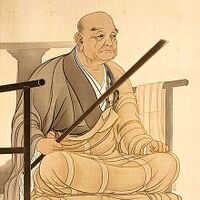Mazu Daoyi
| PersonType | Category:Chinese Buddhist Teachers |
|---|---|
| MainNamePhon | Mazu Daoyi |
| MainNameChi | 馬祖道 |
| MainNamePin | Mǎzŭ Dàoyī |
| SortName | Mazu Daoyi |
| AltNamesOther | Ma-tsu |
| bio | Mazu Daoyi (709–788) (Chinese: 馬祖道一; pinyin: Mǎzŭ Dàoyī; Wade–Giles: Ma-tsu Tao-yi, Japanese: Baso Dōitsu) was an influential abbot of Chan Buddhism during the Tang dynasty. The earliest recorded use of the term "Chan school" is from his Extensive Records. Master Ma's teaching style of "strange words and extraordinary actions" became paradigmatic Zen lore.
His family name was Ma – Mazu meaning Ancestor Ma or Master Ma. He was born in 709 northwest of Chengdu in Sichuan. During his years as master, Mazu lived in Jiangxi, from which he took the name "Jiangxi Daoyi". In the Transmission of the Lamp, compiled in 1004, Mazu is described as follows:
According to the Transmission of the Lamp, Mazu was a student of Nanyue Huairang (677-744) at Mount Heng in Hunan. A story in the entry on Nanyue Huairang in the Transmission of the Lamp is regarded as Mazu's enlightenment-account, though the text does not claim it as such. An earlier and more primitive version of this story appears in the Anthology of the Patriarchal Hall which was transcribed in 952:
This story echoes the Vimalakirti Sutra and the Platform Sutra in downgrading purificative and gradualist practices instead of direct insight into the Buddha-nature. . . . Though regarded as an unconventional teacher, Mazu's teachings emphasise Buddha-nature:
|
| YearBirth | 709 |
| YearDeath | 788 |
| BornIn | Chengdu, Sichuan |
| IsInGyatsa | No |
| Other wikis |
If the page does not yet exist on the remote wiki, you can paste the tag |

